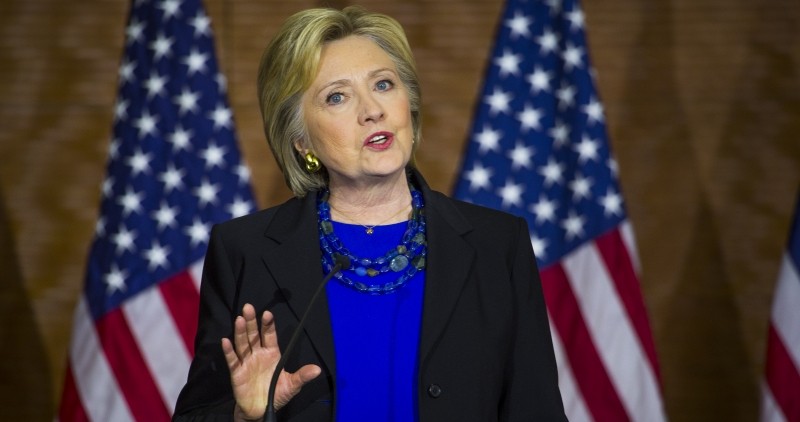
Washington, March 29 – On Monday, Secretary Hillary Clinton called for the end of tiered wages and the increase of the minimum wage for all people, including those with disabilities.
“When it comes to jobs, we’ve got to figure out how we get the minimum wage up and include people with disabilities in the minimum wage,” Clinton said in Madison, Wisconsin while replying to a question by an autistic adult about subminimum wages for disabled workers. “There should not be a tiered wage, and right now there is a tiered wage when it comes to facilities that do provide opportunities but not at a self-sufficient wage that enables people to gain a degree of independence as far as they can go.”
Seventy percent of the 22 million working-age Americans with disabilities are out of the workforce (compared to 28 percent of Americans without disabilities), and of those people with disabilities who are working, many are working only part time and more than 400,000 are earning subminimum wage (as little as 20 cents an hour) in sheltered workshops, where people make much less than minimum wage for doing jobs beneath their skill levels.
“I want us to take a hard look at raising the minimum wage and ending the tiered minimum wages, whether it’s for people with disabilities or the tipped wage,” Clinton added. “When people talk about raising the minimum wage, they don’t always talk about the legal loopholes that we have in it and I want to get rid of those and I want to get rid of that for people with disabilities too.”
Fully one-in-five Americans have a disability and polls show that most of them want to work. Yet 70 percent of working-age Americans with disabilities are outside of the workforce. Negative attitudes toward people with disabilities are major barriers to competitive and integrated employment, which is the desired outcome for many people with disabilities. People with disabilities are seeking the same opportunities as everyone else as they go into the workforce.
Sanders Touts Support of WIOA, Limiting Use of Subminimum Wage

In his response to the #PwDsVote 2016 Campaign Questionnaire, Sen. Bernie Sanders talked about his support in 2014 for the Workforce Investment and Opportunity Act (WIOA) and competitive integrated employment.
WIOA “took steps in the right direction to ensure that individuals with disabilities can fully participate in the workforce and be self-sufficient,” Sanders wrote. “Among the many positive provisions, WIOA seeks to increase competitive integrated employment and decrease the number of individuals in non-integrated employment. Further, WIOA seeks to limit the use of the subminimum wage, where individuals with disabilities are paid less than the minimum wage for the same work as their nondisabled peers.”
In addition, Sanders touted his work in passing the stimulus package in 2009 that included $900,000 for vocational rehabilitation programs for training, assistance and ongoing support to help people with disabilities find employment in Vermont and $242,913 for the Vermont Center for Independent Living, which works to promote the independence and rights of Vermonters with disabilities. These programs would provide support for competitive integrated employment, the desire of many in the disability community. He also has called for assisting people with disabilities in becoming small business owners.
Kasich: Don’t Push People with Disabilities to the Side in Sheltered Workshops

On the Republican side, Ohio Gov. John Kasich has spoken out against sheltered workshops on several occasions.
“We shouldn’t take people and put them in a setting just because we’ve done it for the last 50 years,” the Ohio governor said in New Hampshire in December. “People who have severe disabilities can work in hospitals and grocery stores and libraries.”
While campaigning in Iowa a month later, he talked about how Ohioans with disabilities are being taken out of sheltered workshops and being employed in competitive integrated opportunities in places like hospitals and grocery stores.
“They don’t have to sit in some sheltered workshop being just pushed to the side,” Kasich said while on the campaign trail in Virginia in February. “That is not right in our country.”
In March 2012, Kasich signed an executive order making Ohio an “Employment First” state, which resulted in an increase in individuals moving into competitive integrated employment. In 2014, 4,580 Ohioans with disabilities were able to find jobs through vocational rehabilitation services provided by the reformed and renamed Opportunities for Ohioans with Disabilities. One of the best programs to help people with disabilities pursue the American Dream originated in Ohio—Project SEARCH. It has been able to successfully recruit, train and place thousands of people with disabilities into jobs in 43 states across the country. Project SEARCH is achieving a 70 percent success rate in transitioning students with disabilities into competitive, integrated employment. It is a win-win-win model for how to serve the interests of people with disabilities, employers and taxpayers as well.
Neither Sen. Ted Cruz nor businessman Donald Trump has talked about subminimum wage or sheltered workshops on the trail. As the presidential candidates begin to speak in more specifics about topics, it is important for them to not only take a public position on a variety of disability issues but also to speak about them during their speeches.
Former Sec. of State Hillary Clinton and Sen. Bernie Sanders responded by addressing all of the questions in the #PwDsVote 2016 Campaign Questionnaire, and Ohio Gov. John Kasich filled out parts of the questionnaire. All three have spoken about these issues while on the trail on multiple occasions. Despite numerous requests in person and by phone and email, the campaigns of Sen. Ted Cruz and Republican frontrunner Donald Trump have not yet filled out the questionnaire.
As the candidates vie for their parties’ nomination and look on to the general election, reaching out to the disability community can mean the difference between winning or not. More than 50 percent of Americans report having a family member or close friend with a disability. Fifty-two percent of Democrats report that they or a loved one has a disability, and for Republicans, a smaller number of 44 percent report they have a disability. Surprisingly, Independents have the largest number of voters who say they have a disability, with 58 percent saying yes. This shows that swing voters with disabilities and their families are up for grabs.

[…] specifically focusing onAlzheimer’s, autism and disability rights in general. She also announced that she opposes minimum wage exemptions for employers who hire workers with […]
[…] estimated 400,000 disabled people earn subminimum wage in sheltered workshops. They do not make enough money to support themselves […]
Hilary needs to visit a real workshop. Not Goodwill or some national “chain”. But a true workshop. Because she is sorely uneducated. Ask Zafor Ullah. He has visited us all.
[…] #PwDsVote Presidential Questionnaire and first pledged to end sub-minimum wage while speaking at a campaign rally in […]